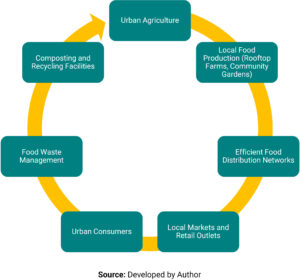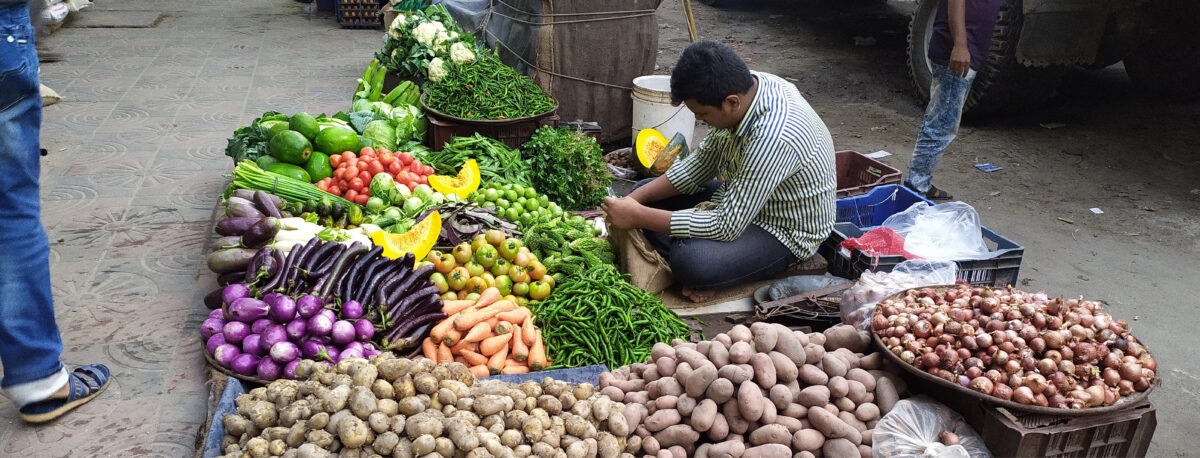Author: Md. Jubaer Rashid, Country Representative, ICLEI South Asia, jubaer.rashid@iclei.org
Image: Md. Jubaer Rashid
Key Words: Food Security, Urban Agriculture, Food Distribution, Urban Food Systems, Urban Farmers
Introduction
As Bangladesh experiences rapid urbanization, ensuring sustainable and resilient food systems in its cities has become a critical challenge. Urban food systems encompass the entire food chain from production and distribution to consumption and waste management within urban areas. These systems include not only the physical processes and infrastructure involved in growing, processing and distributing food but also the economic, social and environmental contexts that influence how food is accessed and consumed by urban populations. With the country’s urban population growing, complexities associated with feeding city residents are becoming more pronounced. Addressing issues related to food security, environmental impact and public health in urban areas of Bangladesh is imperative for sustainable development. This article explores the challenges and opportunities of urban food systems in Bangladesh and provides practical recommendations for creating more sustainable and resilient systems.
Current Status
In Bangladesh, urban food systems face diverse challenges. Dhaka, for instance, is grappling with food insecurity in its low-income neighborhoods, where access to fresh, affordable and nutritious food is limited. Urban agriculture initiatives are emerging, such as rooftop farming projects in Dhaka and Chattogram, aiming to provide fresh produce to city dwellers. However, these initiatives are still in their nascent stages and require substantial support to scale up.
In Chattogram, the port city’s dense population and rapid urban growth have led to significant challenges in food distribution and access. While rooftop farming and community gardens are gaining traction, these efforts need greater support to meet the food demands of the urban poor effectively.
Khulna, located in the southwestern part of Bangladesh, faces unique challenges due to its proximity to the Sundarbans and frequent flooding. Initiatives such as floating gardens and aquaculture projects have been introduced to adapt to these conditions, but they still require extensive development to be sustainable and widely adopted.
In Rajshahi, efforts to incorporate sustainable food practices are evident in community-led gardening projects, but these face hurdles such as limited space, resources and technical know-how. Similar to Rajshahi, cities like Barishal and Sylhet are also exploring urban farming and community gardens, yet they face obstacles like insufficient funding and lack of awareness.
These examples highlight the need for innovative and tailored solutions to address the urban food system challenges in Bangladesh.
Issues
Urban food systems in Bangladesh face several key issues:
- Food Security and Access: Many urban residents, particularly in low-income areas, lack reliable access to affordable, nutritious food. This leads to food insecurity and associated health problems such as malnutrition and stunting in children.
- Environmental Impact: The urban food system significantly contributes to environmental degradation, including greenhouse gas emissions and waste generation. Transporting food from rural areas to cities increases the carbon footprint, while urban food waste exacerbates landfill issues.
- Economic Disparities: Small-scale farmers and local food producers struggle to compete with large agribusinesses. This economic imbalance affects local economies and limits the diversity of food options available to urban consumers.
- Infrastructure and Logistics: Efficiently moving food within cities requires robust infrastructure. Many Bangladeshi cities lack the necessary logistics and distribution networks, leading to significant food loss and inefficiencies.
- Public Health: Poor urban food systems contribute to public health crises. Limited access to fresh produce can lead to dietary-related diseases, while food safety issues arise from inadequate storage and handling practices.
Recommendations
To create a sustainable urban food system in Bangladesh, a comprehensive approach is needed that integrates various components of food production, distribution, consumption and waste management. Below is a recommended process with detailed explanations of each step:
 Urban Agriculture:
Urban Agriculture:
Initiate and Support Urban Farming: Promote and support urban agriculture through rooftop gardens, community gardens and peri-urban farms. Encourage the use of unused urban spaces for food production.
Training and Resources: Provide training and resources to urban farmers to improve agricultural practices and yield.
Local Food Production:
Rooftop Farms and Community Gardens: Develop rooftop farms and community gardens to increase local food production. These initiatives reduce reliance on imported food and cut transportation emissions.
Peri-Urban Agriculture: Encourage peri-urban agriculture to utilize the outskirts of cities for larger-scale food production.
Efficient Food Distribution Networks:
Logistics and Infrastructure: Invest in robust logistics and infrastructure, including cold storage facilities and efficient transportation systems to minimize food loss during distribution.
Local Distribution Hubs: Establish local distribution hubs to streamline the supply chain from producers to consumers.
Local Markets and Retail Outlets:
Support Farmers’ Markets: Promote farmers’ markets and local retail outlets that sell fresh, locally produced food. This helps local farmers and provides consumers with access to fresh produce.
Direct-to-Consumer Sales: Facilitate direct-to-consumer sales models such as community-supported agriculture (CSA) programs.
Urban Consumers:
Access to Nutritious Food: Ensure urban residents, particularly those in low-income neighbourhoods, have access to affordable, nutritious food.
Education and Awareness: Conduct public awareness campaigns to educate consumers on the benefits of buying locally-produced food and reducing food waste.
Food Waste Management:
Collection and Segregation: Implement efficient systems for the collection and segregation of food waste from households, markets and restaurants.
Waste Reduction Initiatives: Promote initiatives that reduce food waste, such as food banks and donation programs for surplus food.
Composting and Recycling Facilities:
Organic Waste Processing: Establish composting and recycling facilities to process organic waste. Convert food waste into compost and bioenergy, reducing landfill use and greenhouse gas emissions.
Urban Agriculture Integration: Use compost and recycled nutrients to support urban agriculture, creating a closed-loop system.
Call for Action
The transformation of urban food systems in Bangladesh requires collective effort and innovative thinking. We encourage policymakers, urban planners, community leaders and citizens to take action:
- Advocate for Policy Change: Engage with local governments to support policies that promote sustainable food systems.
- Participate in Urban Farming: Join or start community garden projects and support local farmers’ markets.
- Reduce Food Waste: Practice mindful consumption and support initiatives aimed at reducing food waste.
- Educate and Raise Awareness: Spread the word about the importance of sustainable urban food systems and educate others on how they can contribute.
Together, we can build resilient, equitable and sustainable food systems that nourish our cities and protect our environment for future generations.

